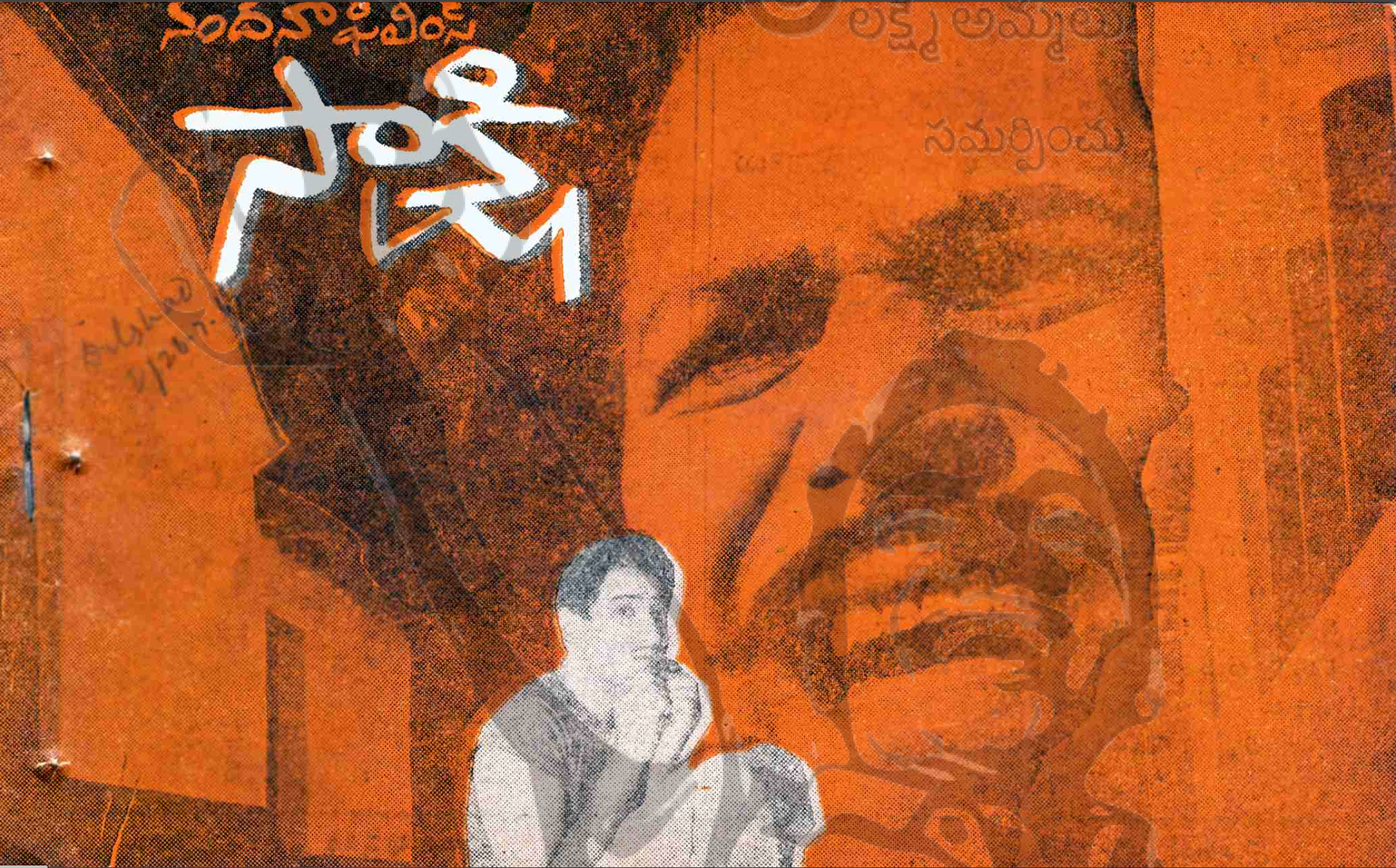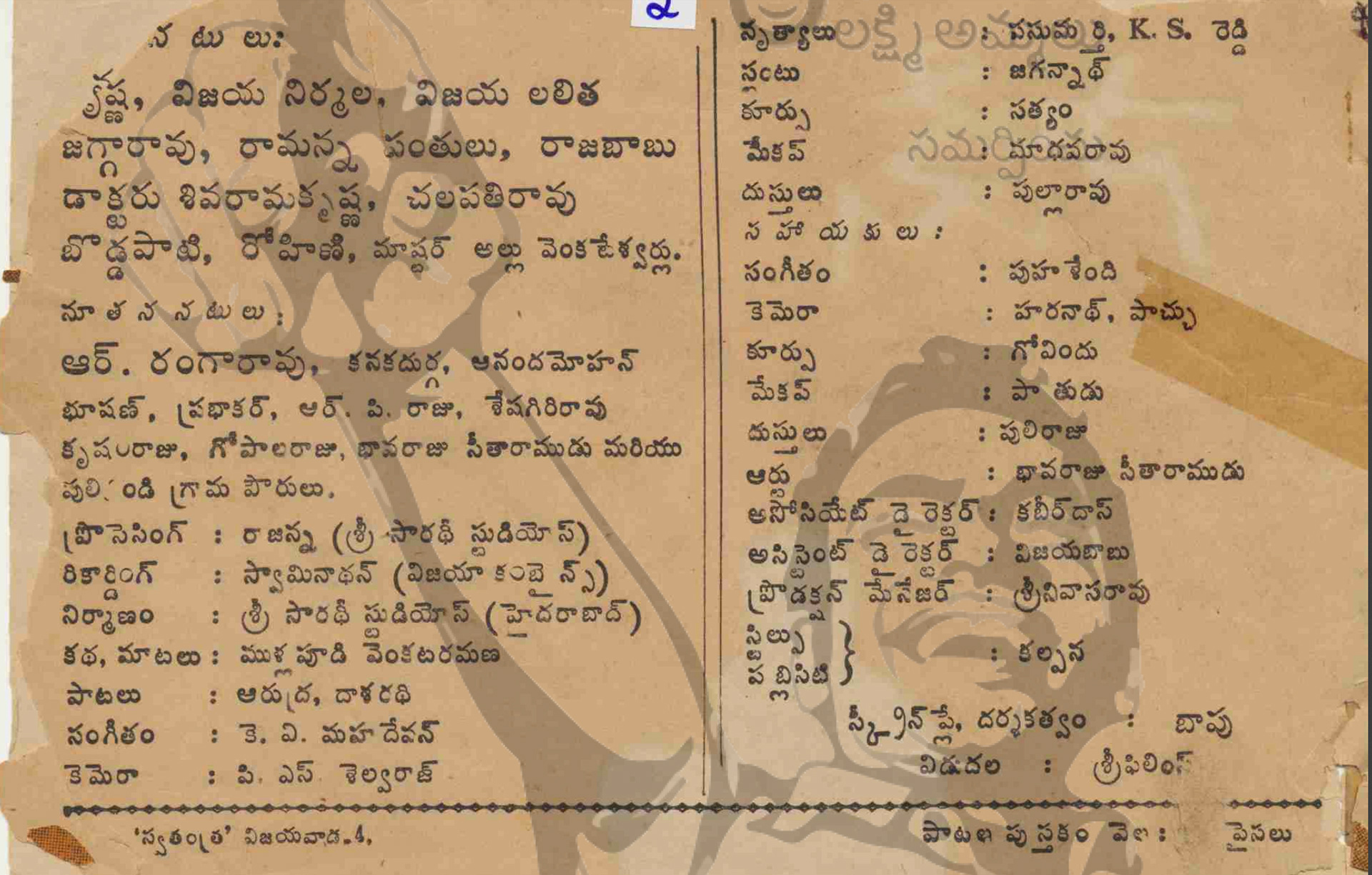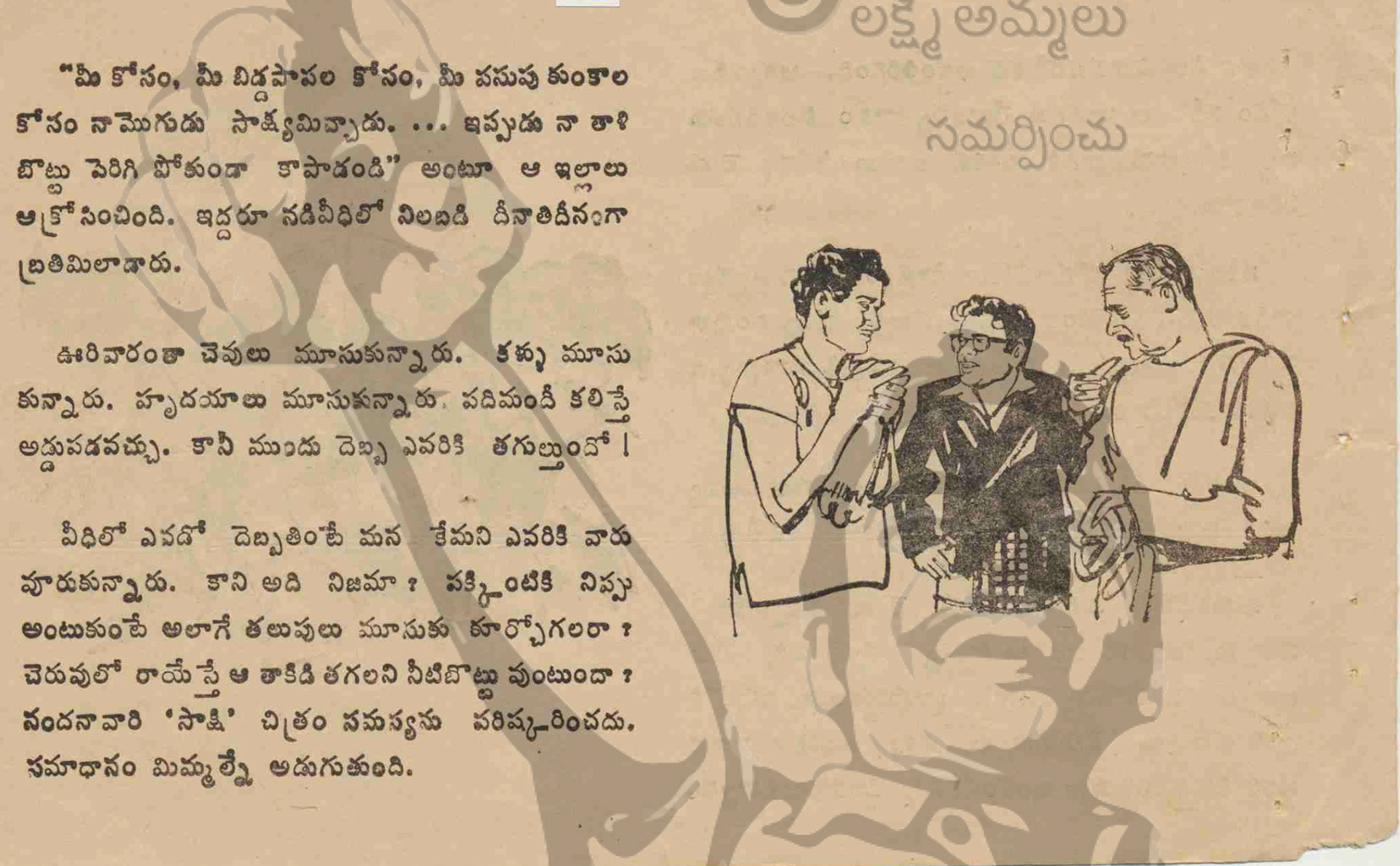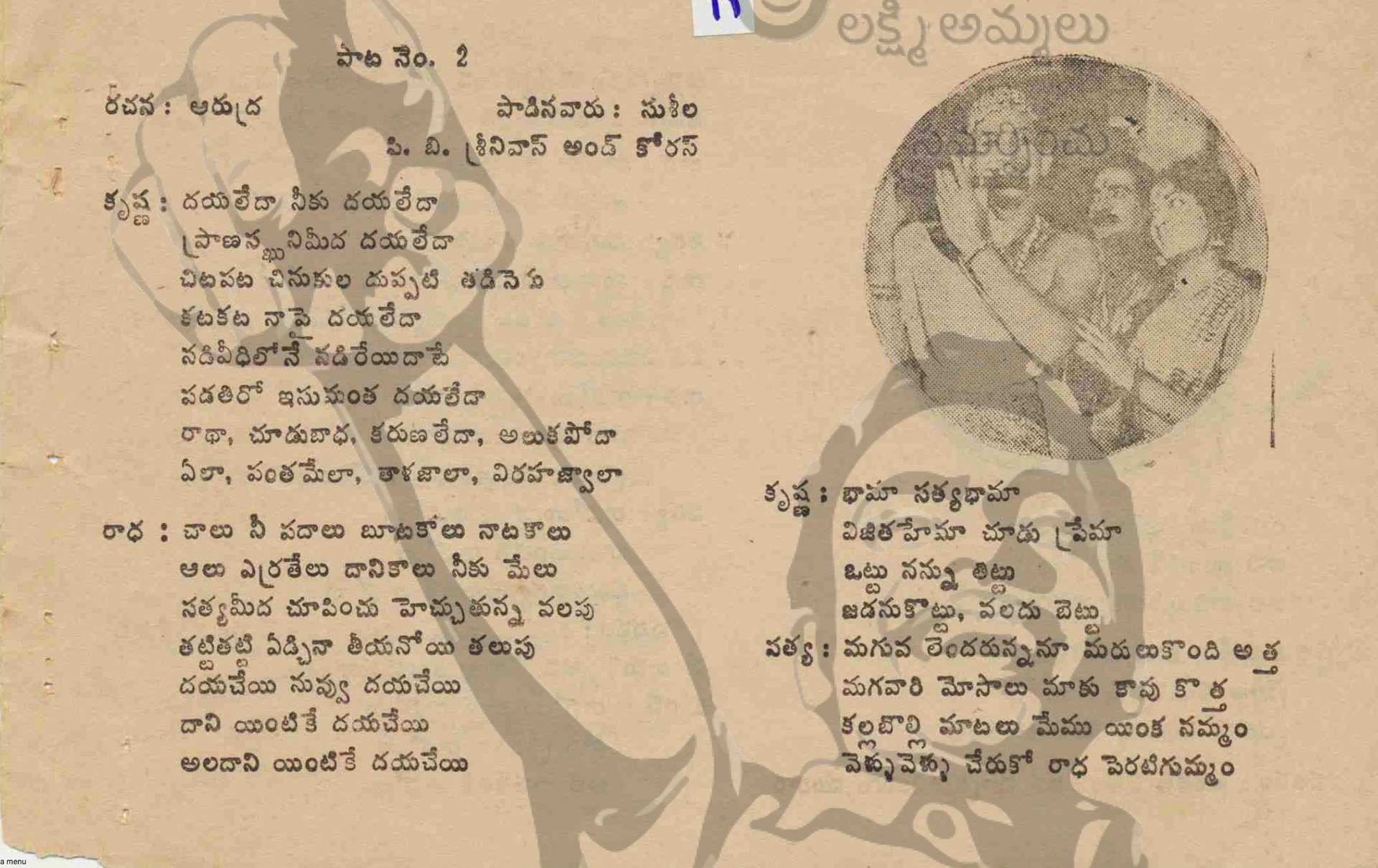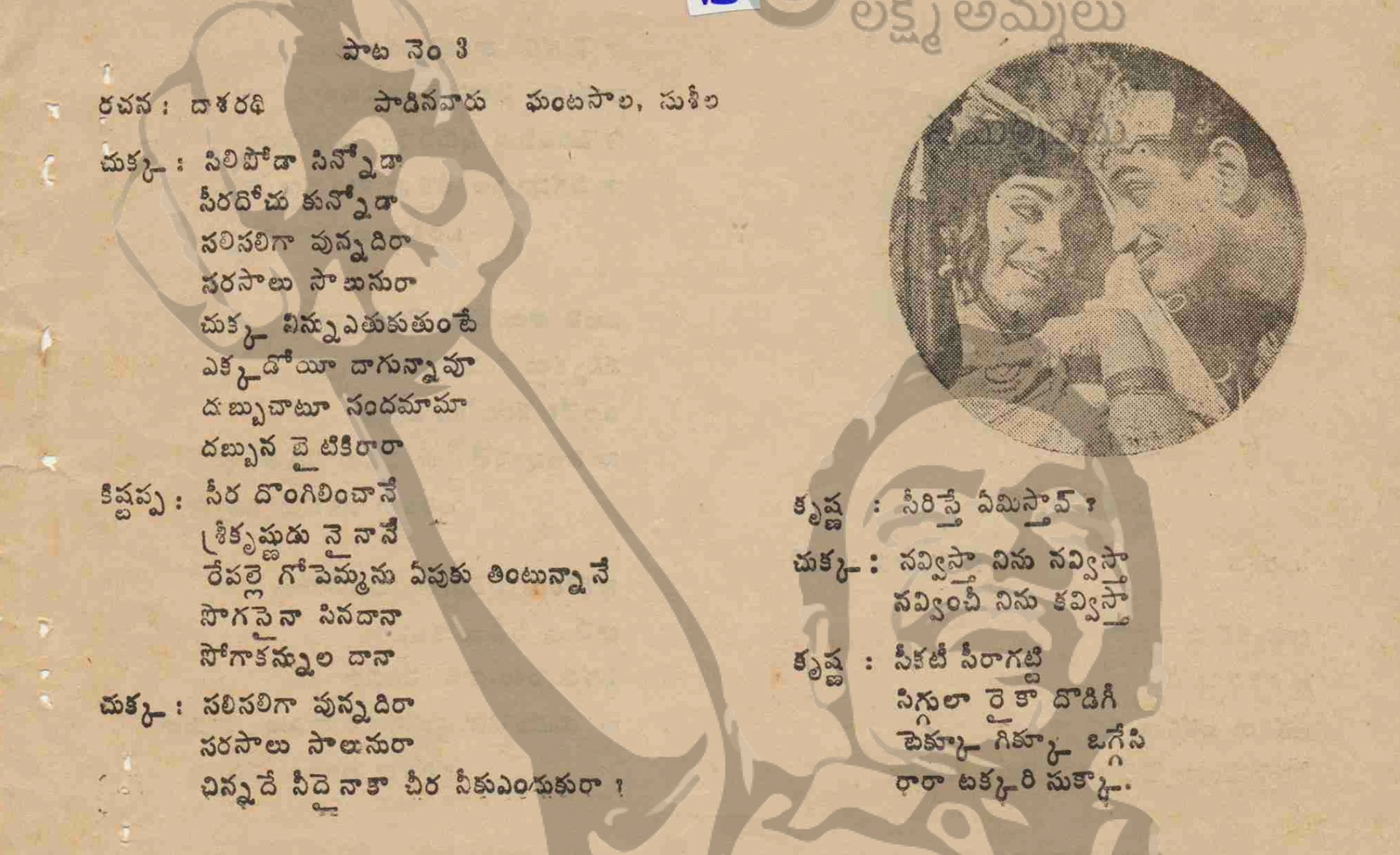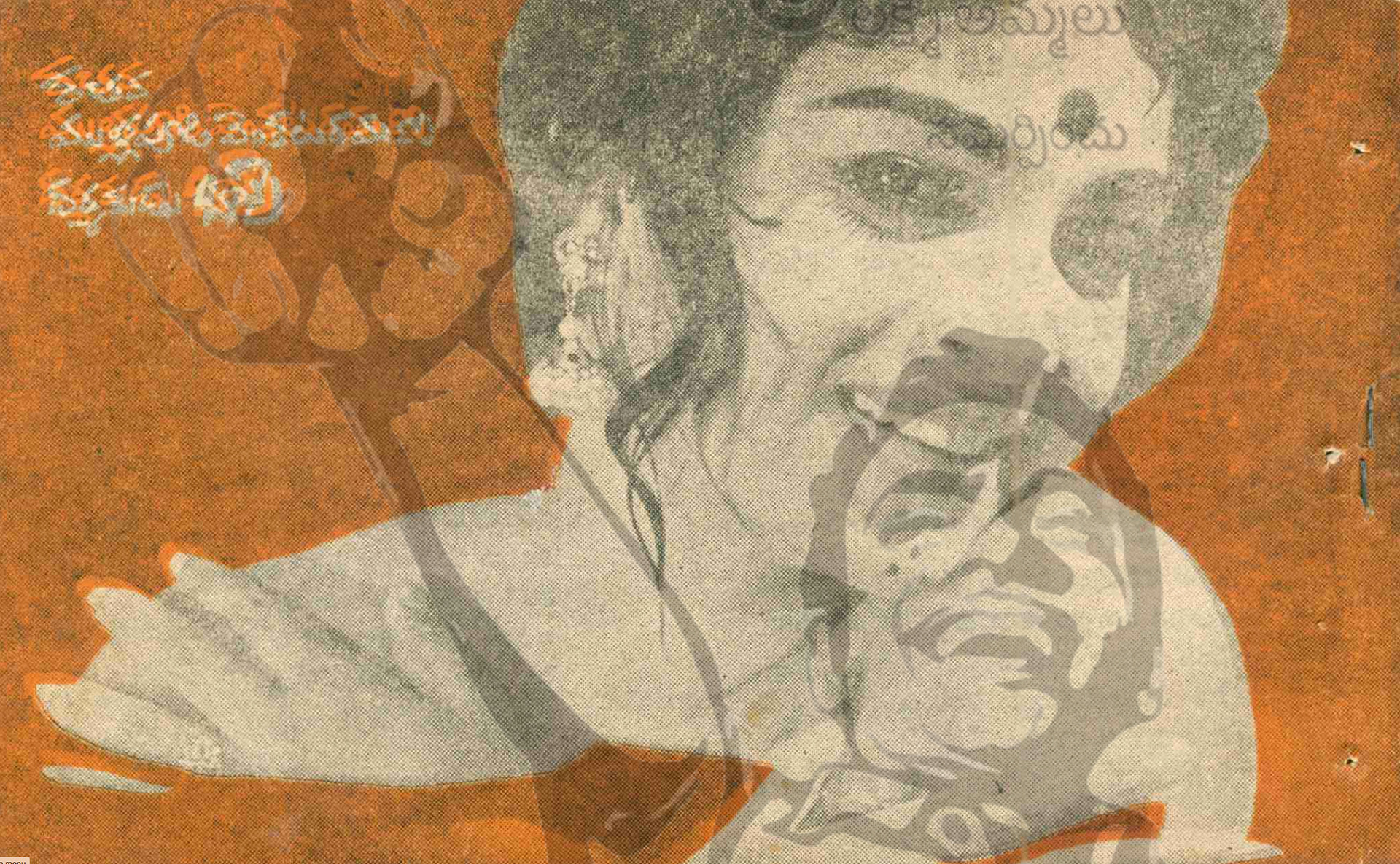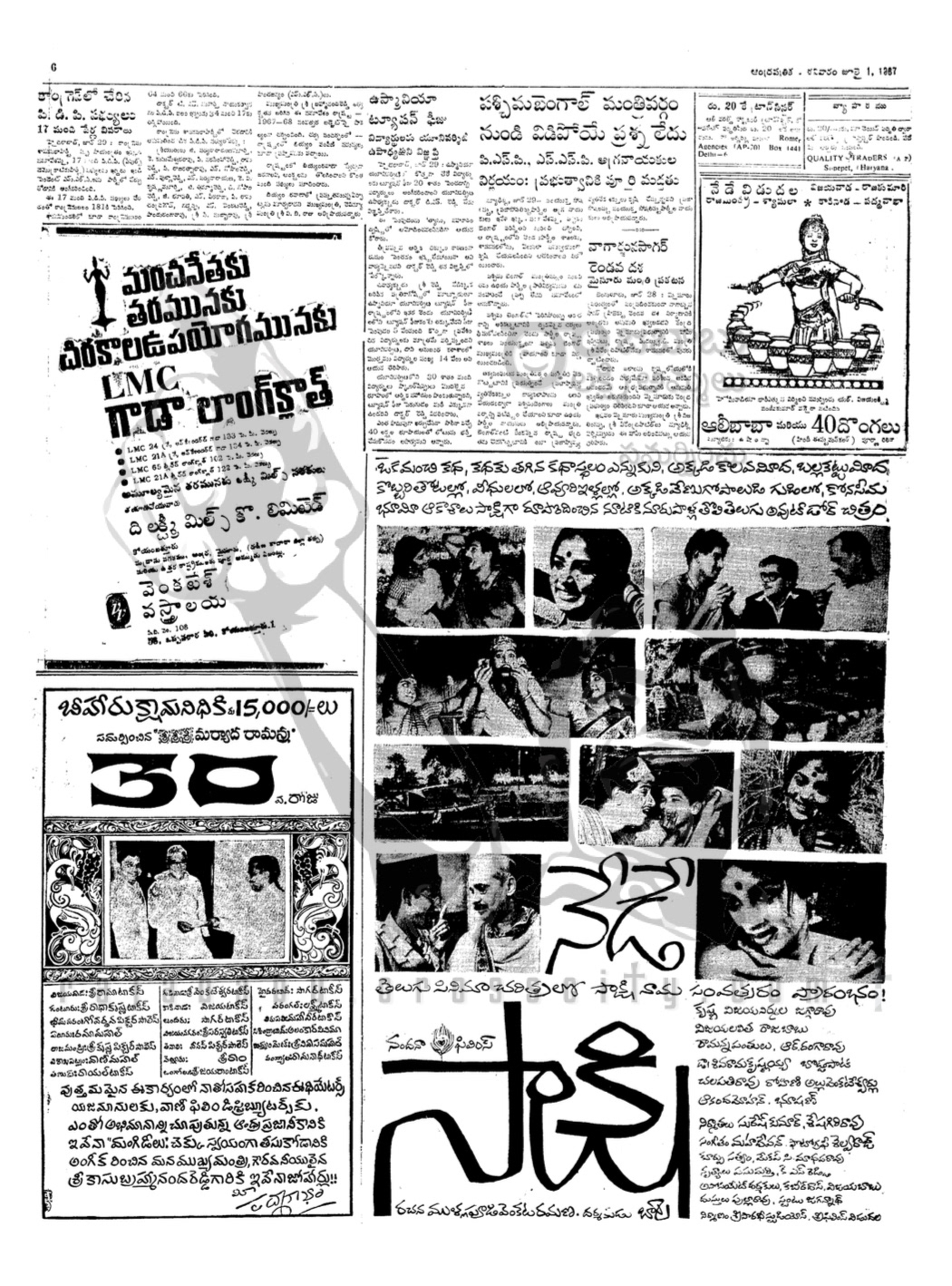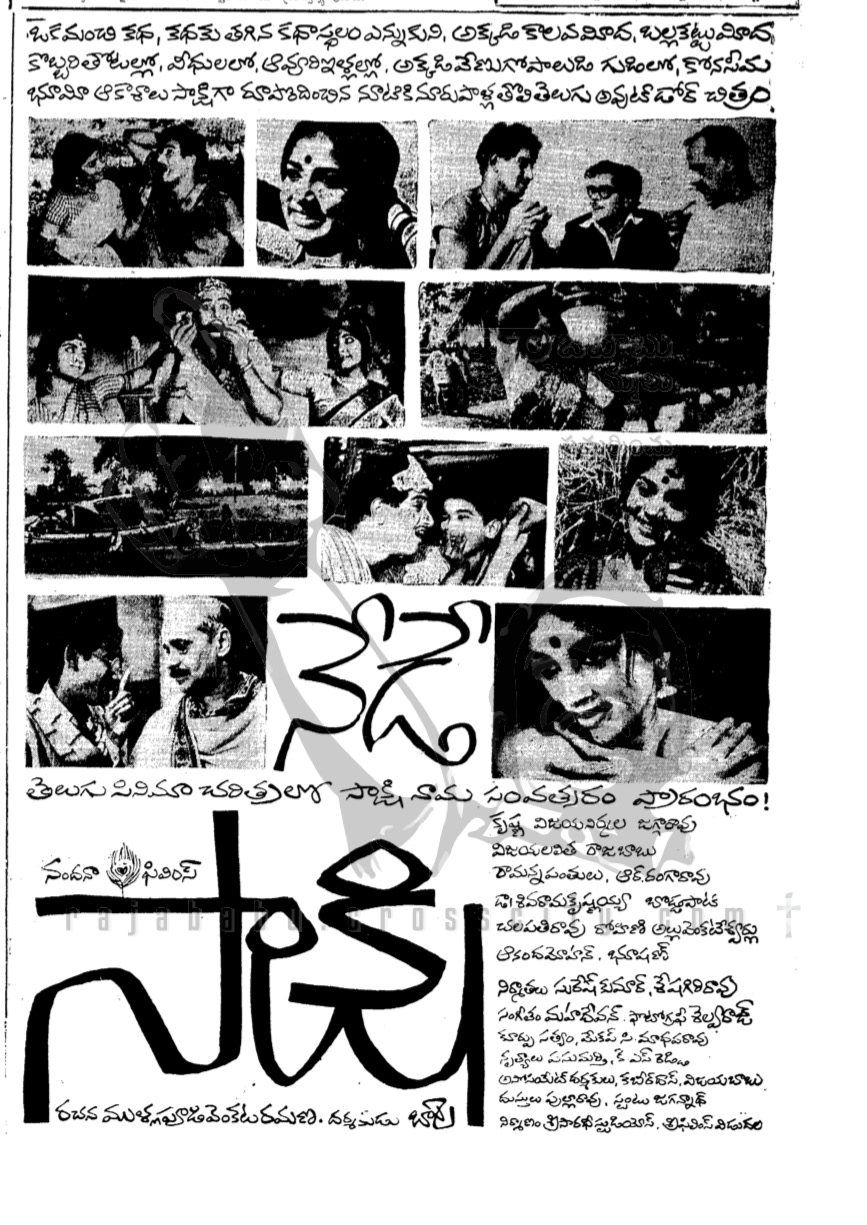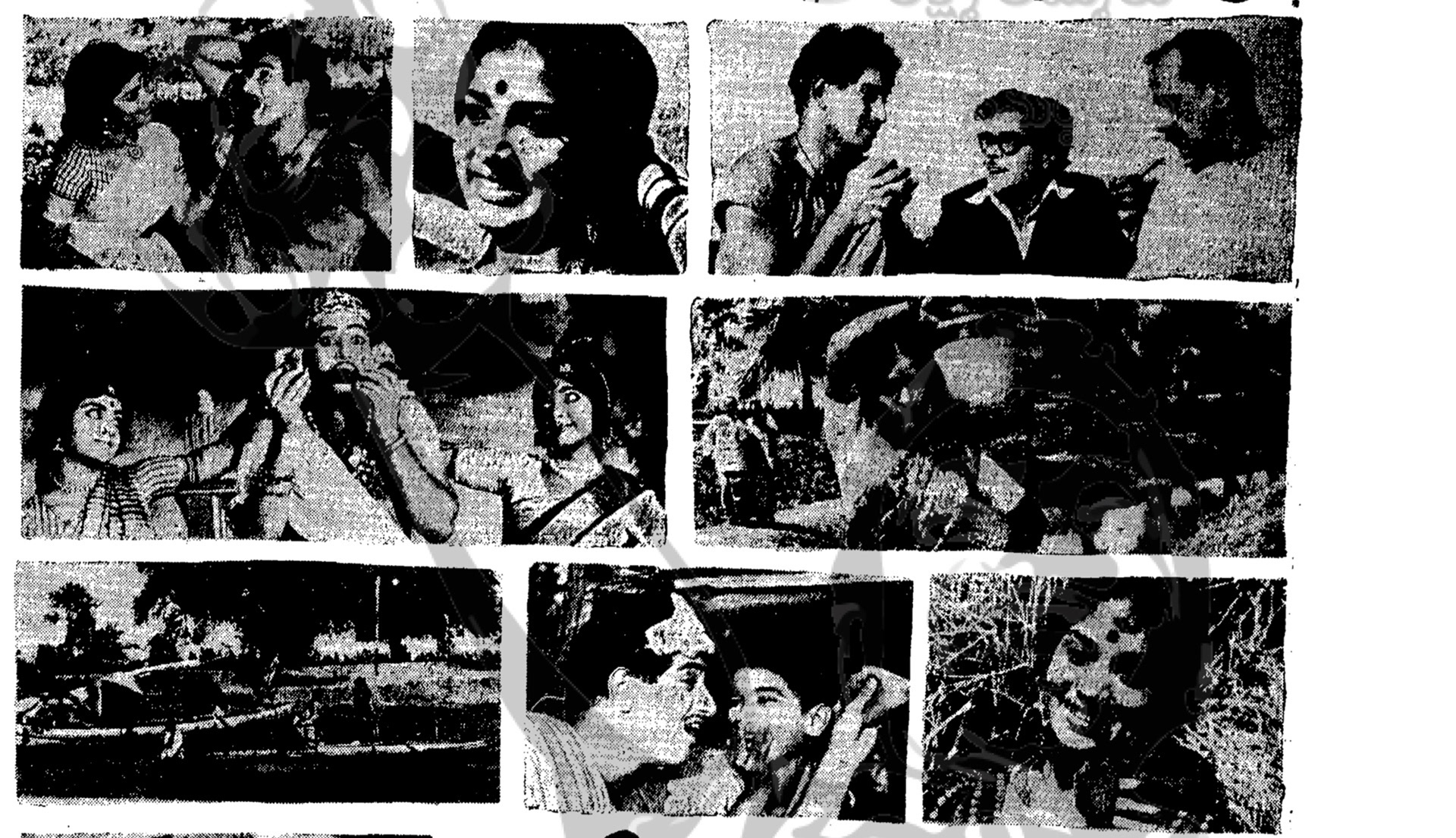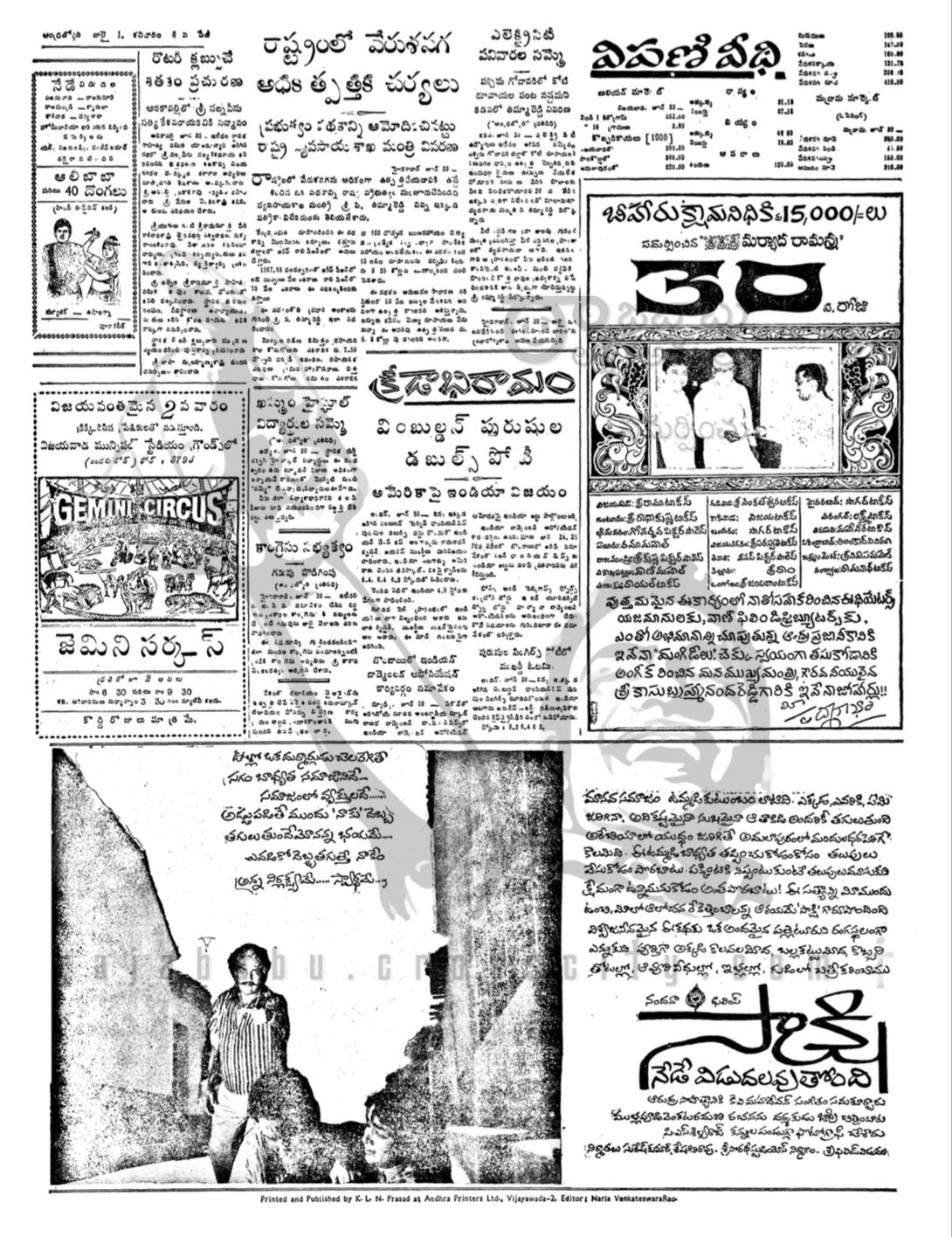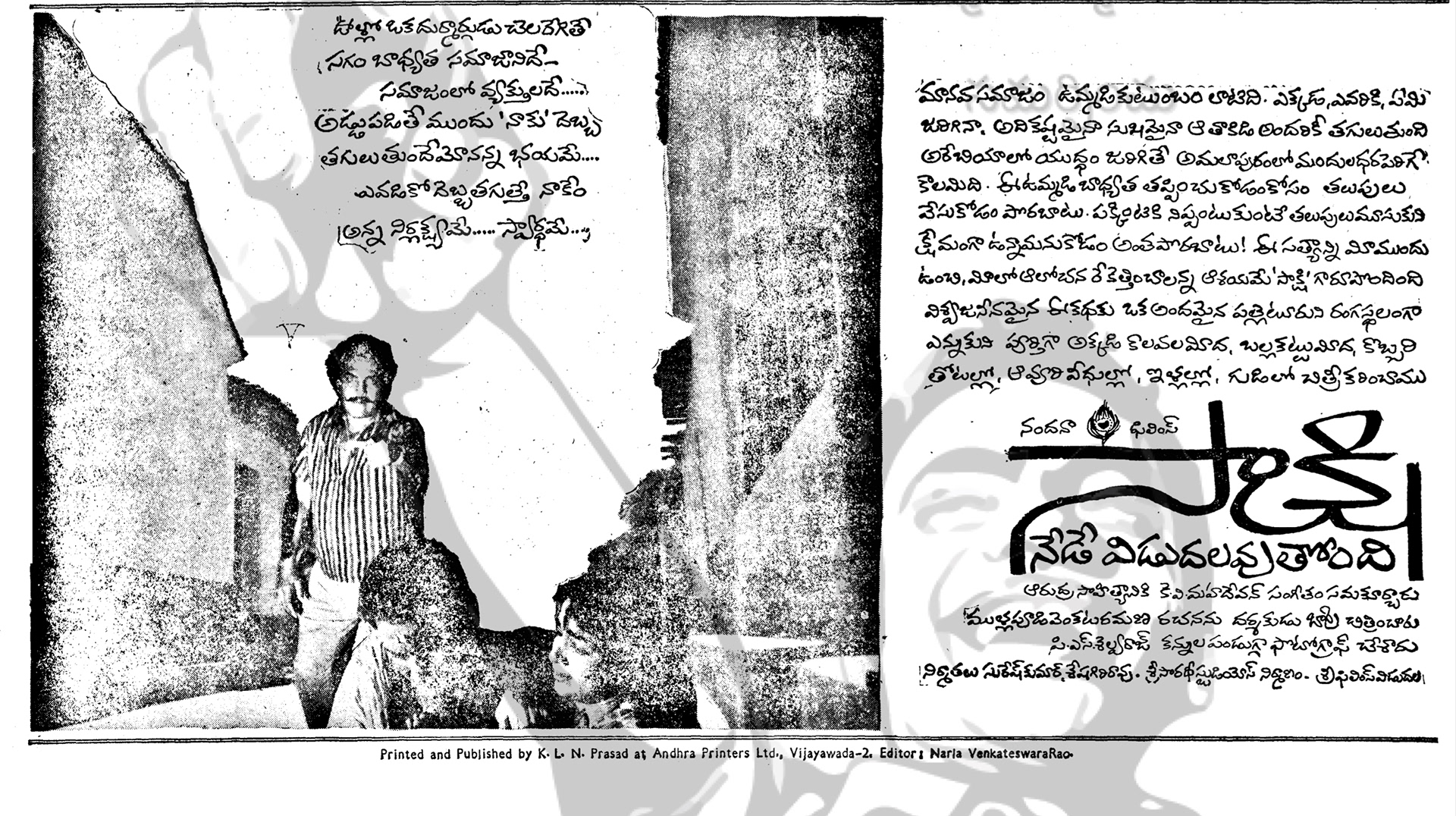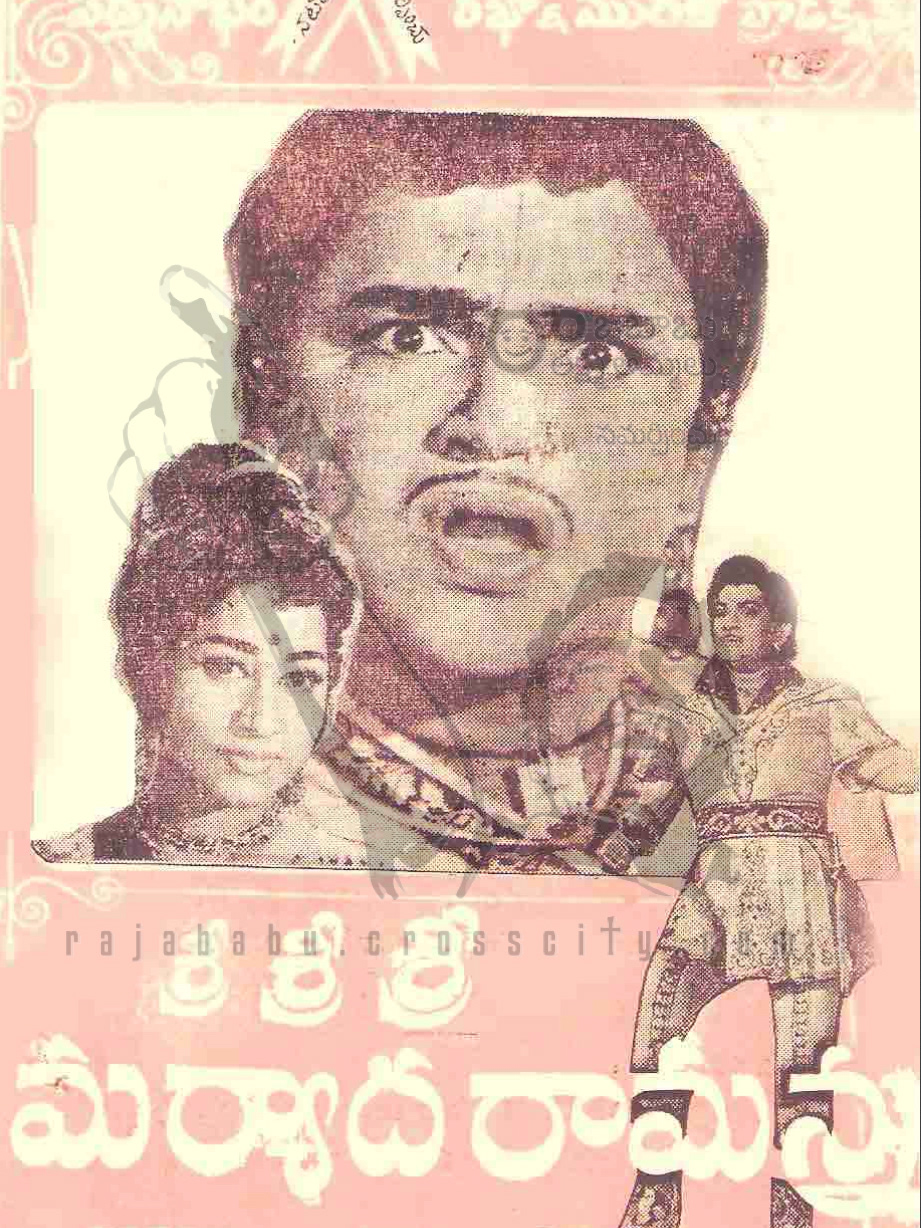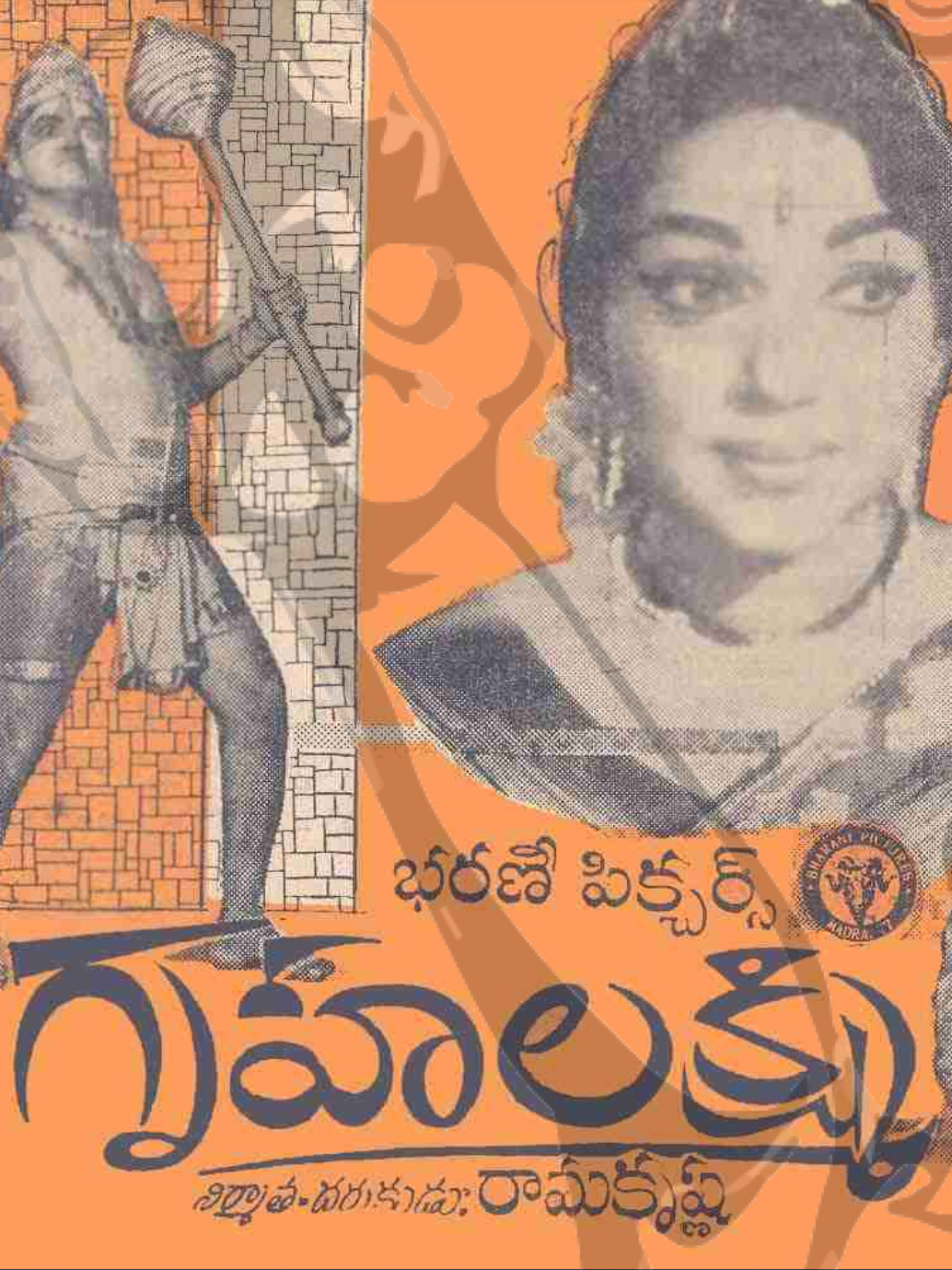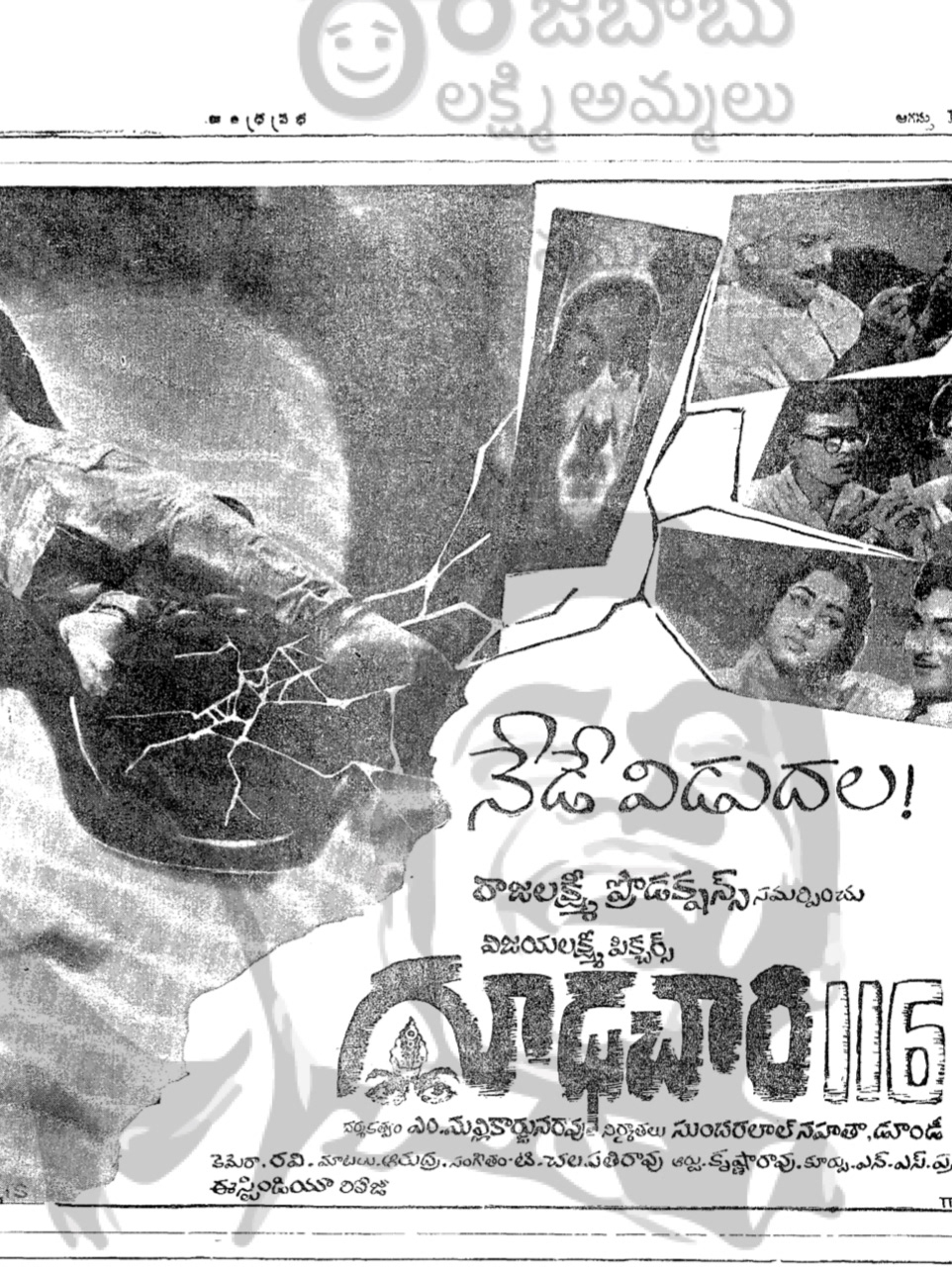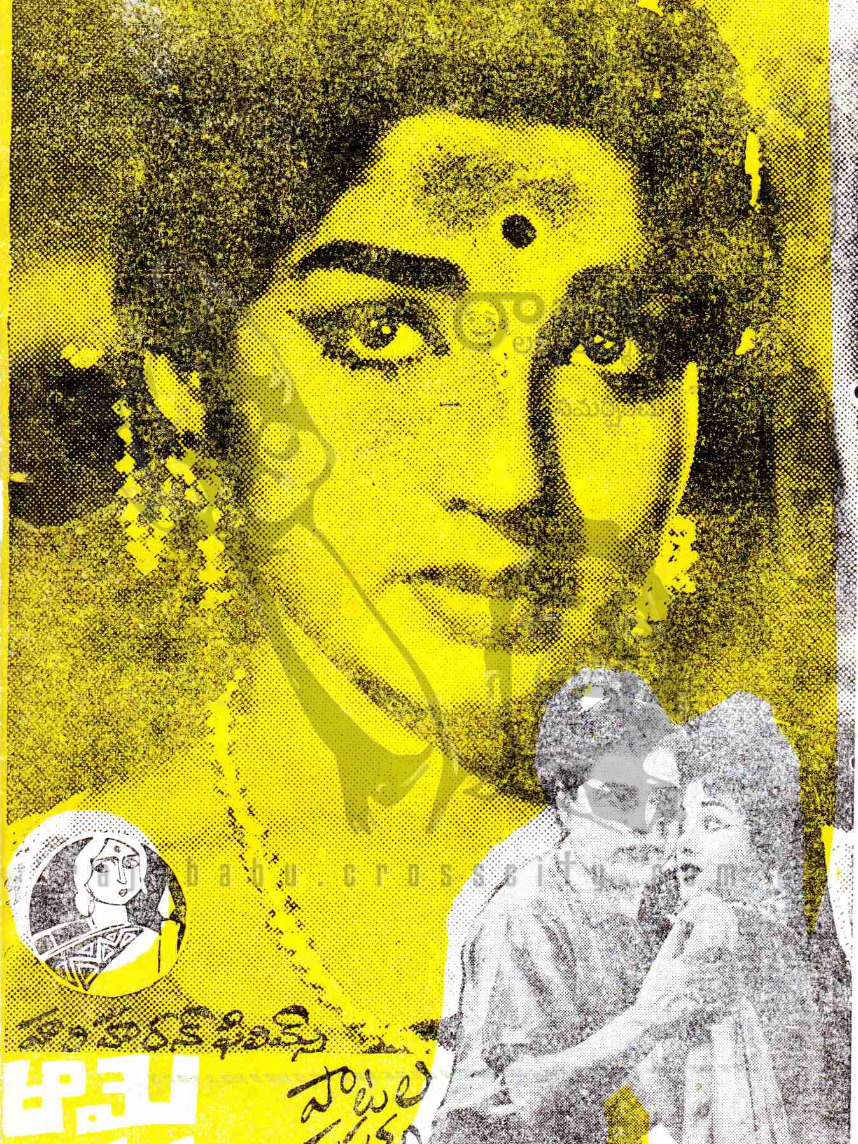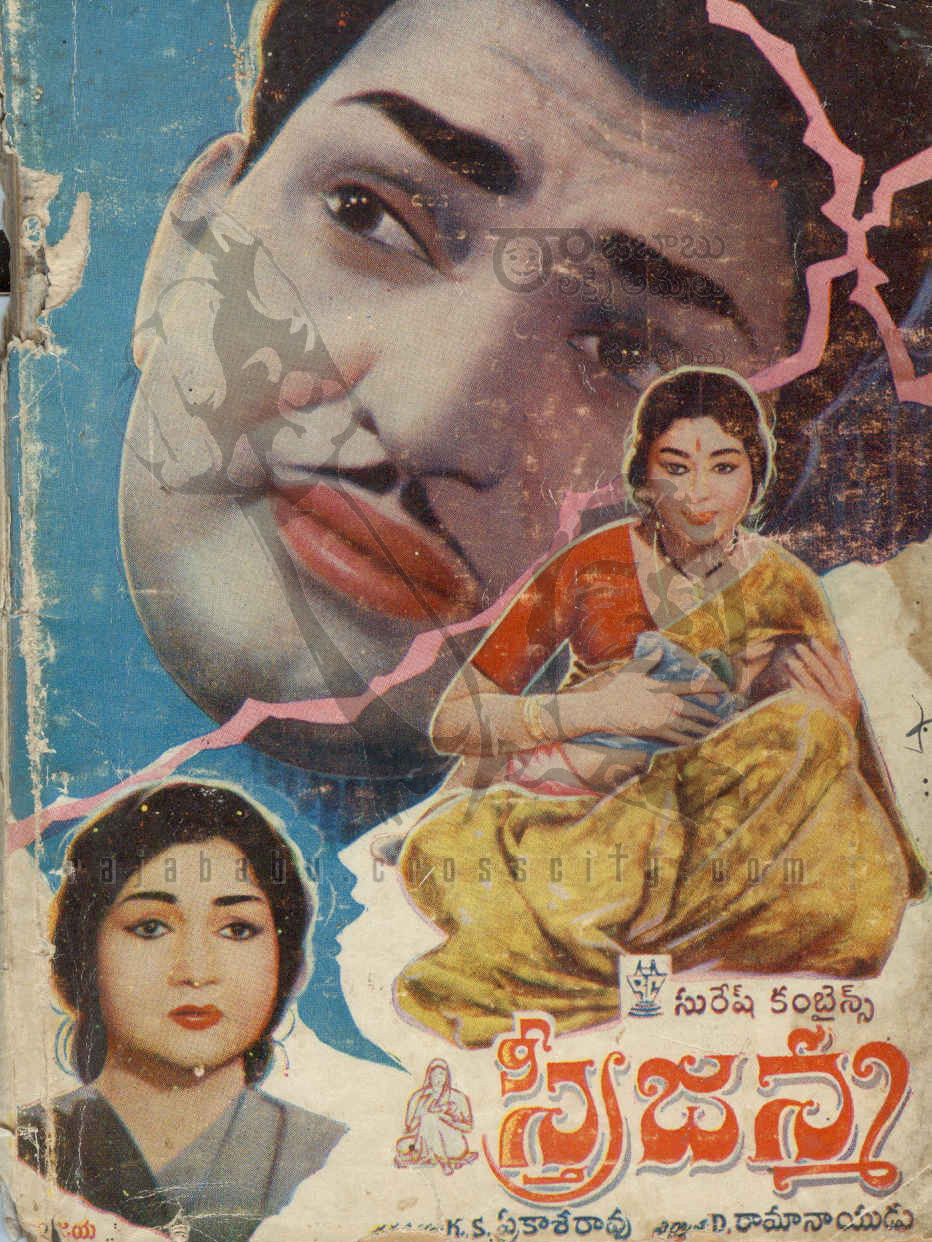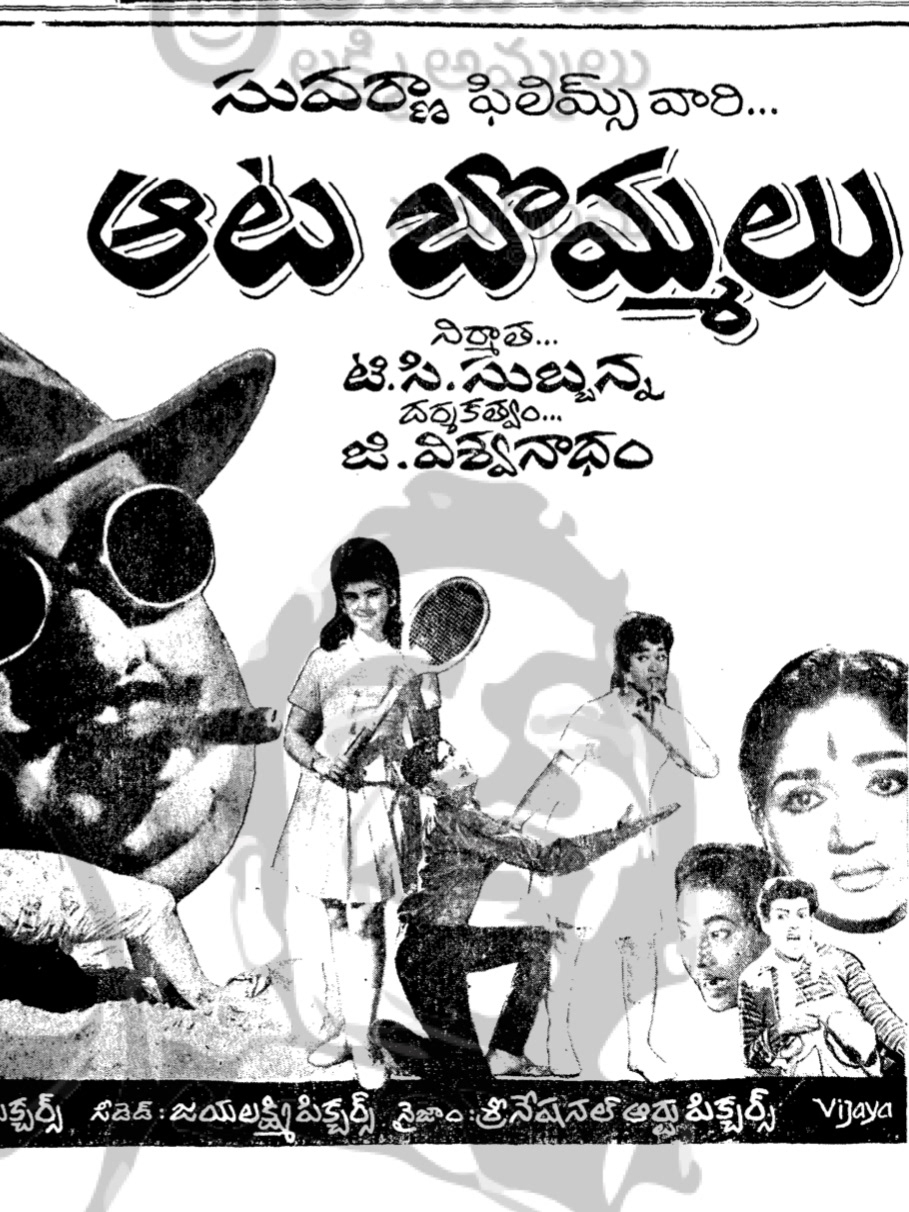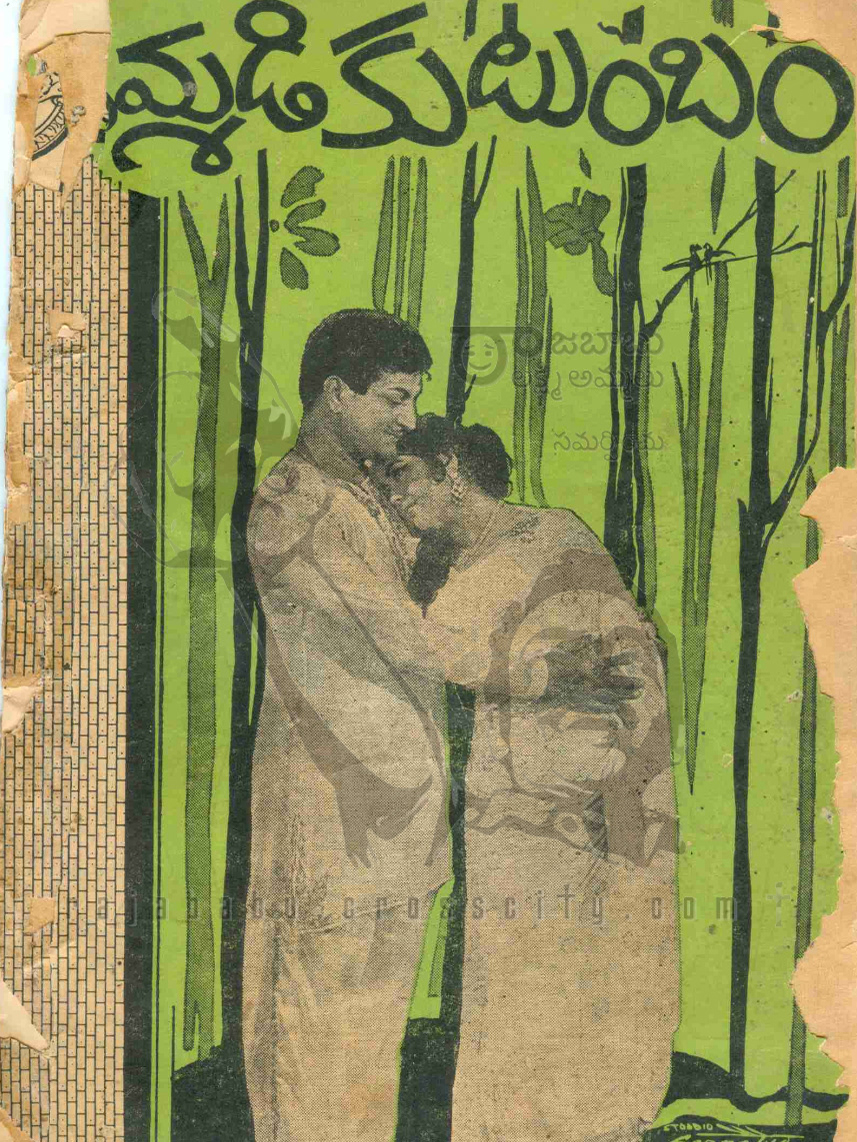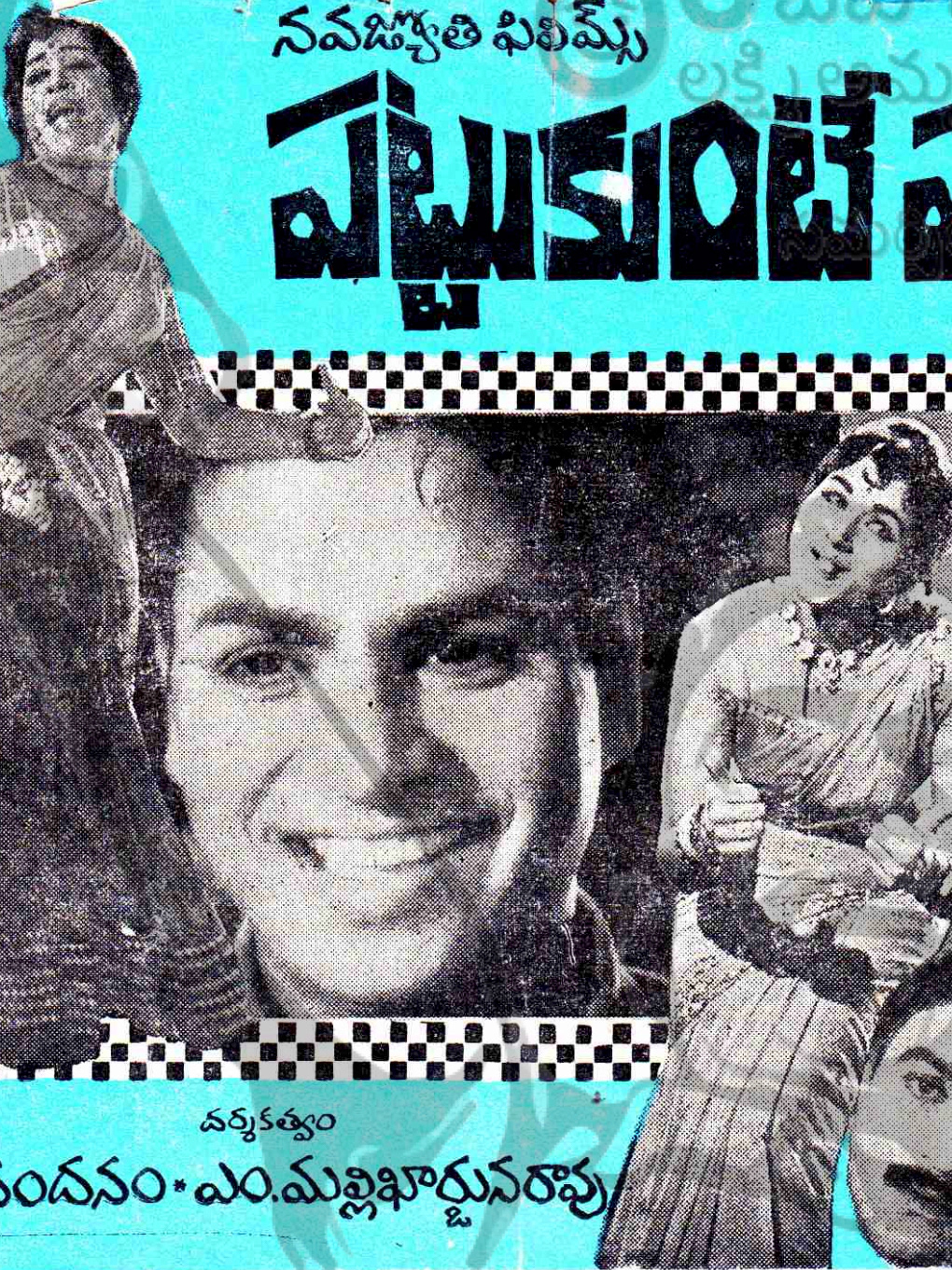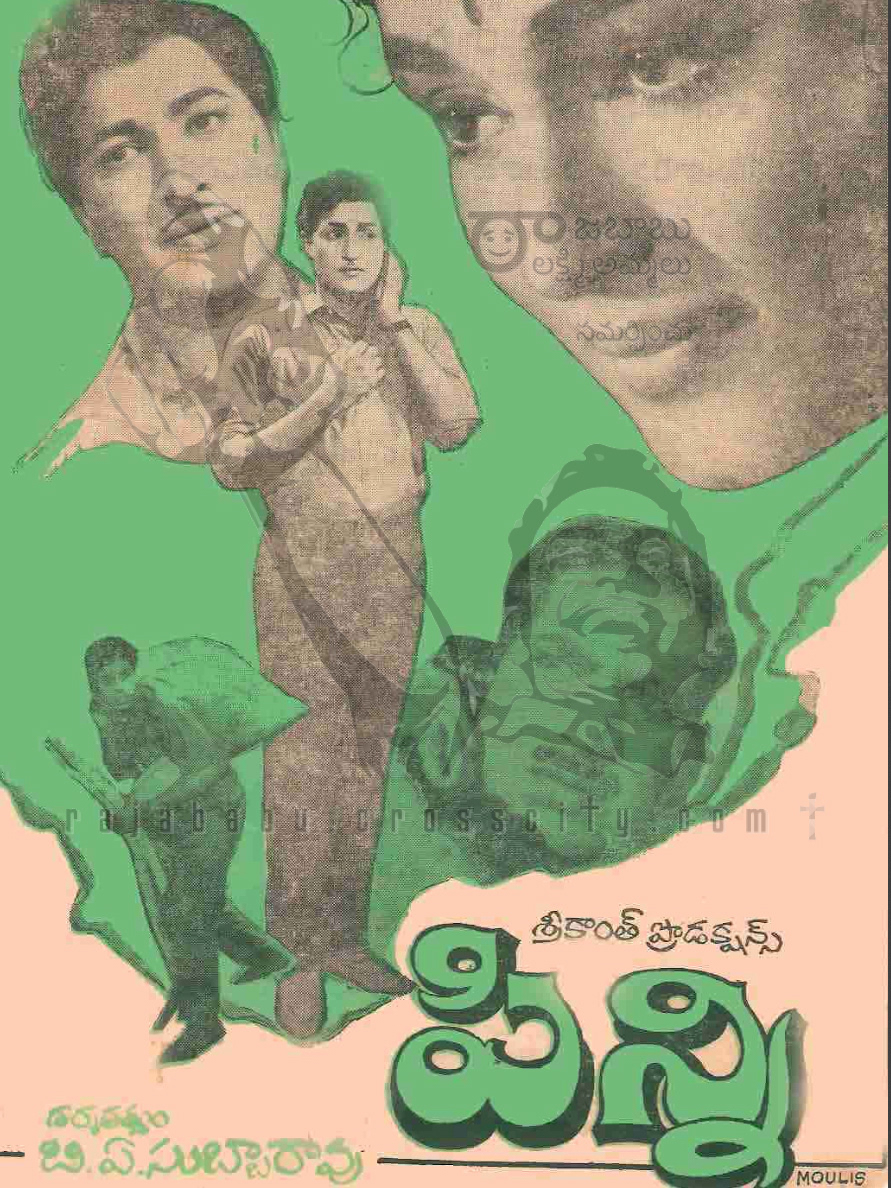Sakshi
Bapu
Country: India; Year: 1967; Language: Telugu; Runtime: 142 min; Color: Black and White
Studio: Nandana Films
Producer: Suresh Kumar, Seshagiri Rao; Writer: unknown; Cinematographer: P.S. Selvaraj; Editor: Satyam; Composer: K.V. Mahadevan; Lyricist: Arudra, Dasaradhi
Cast: Krishna Ghattamaneni, Vijayanirmala, Vijayalalitha, Vinnakota Ramanna Pantulu, Rajababu, Chalapathi Rao, Dr Sivarama Krishnaiah, Boddapati, Rohini, Master Allu Venkateswarlu, P. Naganjaneyulu, Jaggarao, Sakshi Rangarao, Anand Mohan
Topic: Original Language, Released, Manasu Collection
Release Date: July 1, 1967
IMDb ID: 0156034
Story: Mullapudi Venkata Ramana; Screenplay: Bapu; Dialogue: Mullapudi Venkata Ramana
Singer: P. Susheela, Ghantasala Venkateswara Rao, P.B. Srinivas, Mohan Raju
Art Director: Bapu, Bavaraju Sitaramudu; Dance Director: Pasumarthy Krishna Murthy, K.S. Reddy
Synopsis
Bapu’s debut is regarded as an ‘experimental’ movie (it flopped) about rural politics. The villain Fakir (Jagga Rao), a truck driver paid by a local politician, kills two men. A boatman (Krishna) witnesses the murders and the entire village, hoping to get Fakir imprisoned, supports the witness when the case comes to court. However Fakir claims self-defence and he gets a light jail sentence. When Fakir comes out, he publicly announces his intention to kill the boatman. Eventually the boatman’s lover (who is also Fakir’s sister) (Vijayanirmala) kills Fakir. The film introduced the then unknown lead pair of Krishna and Vijayanirmala acting without make-up in outdoor sequences, a standard aspect of New Indian Cinema realism.
Bapu (Director, Screenplay, Art Director) - Show Filmography
(b.1933) Telugu cartoonist, designer and director, also worked extensively in Hindi film. Born in Narsapur, West Godavari, AP, as Sattiraju Lakshminarayana. Graduated as a lawyer from Madras University (1955). Collaborated with comic writer Mullapoodi Venkataramana; political cartoonist for Andhra Patrika newspaper (1955) and illustrator. Worked in advertising in the early 60s. Début with Saakshi, a rare instance of late 60s New Indian Cinema aestheticism in Telugu. Occasionally resorted to painterly imagery in his otherwise realist approach (e.g. Muthyala Muggu). Transposed several mythological narratives into contemporary fables (Manavoori Pandavulu, remade in Hindi as Hum Paanch). Some early work invoked rationalist ideology and Hum Paanch was strongly defended by populist independent Left. Later films are unashamedly revivalist: e.g. Thyagayya, a remake of Nagaiah’s 1946 film. His Hindi films are usually remakes of Telugu ones: Bezubaan is based on S.P. Muthuraman’s Mayangurikal Oru Madhu (1975) but with a modified role for Naseeruddin Shah; Radha Kalyanam is adapted from Bhagyaraj’s Andha 7 Natkal (1981); he remade his adaptation in Hindi as Woh Saat Din. Remade B.R. Chopra’s notorious rape movie, Insaaf Ka Tarazu (1980), as Edi Nyayam Edi Dharmam.
Krishna Ghattamaneni (Cast)
Ghantamneni Sivarama Krishna (b. 1943) Telugu actor, producer and director born in Tenali taluk, Guntur, AP. Educated in Tenali; graduated from the Eluru C.R. Reddy College. Stage actor before joining films. First break in Adurthi Subba Rao’s all-new-faces film Thene Manasulu, playing the second lead. Achieved critical acclaim in Bapu’s Saakshi, working for the first time with his future wife, actress-filmmaker Vijayanirmala. Became a top Telugu star with the influential hit, Goodachari 116 (remade in Hindi as Farz, 1967), a James Bondtype thriller. Known mainly for thrillers and police dramas, including remakes of Hollywood films. In the 70s he starred in over a dozen films annually. Established the Padmalaya Films prod. co. which grew into the famous Padmalaya Studio in Hyderabad, one of the largest and most elaborately equipped studios in the country. With Mosagalluku Mosagadu, he introduced aspects of the Italian western into Telugu cinema. Ventured successfully into Hindi with the Jeetendra and Sridevi film Himmatwala (1983), but could not repeat the success with Sinhasan/ Simhasanam, a big-budget flop starring Jeetendra in the Hindi and himself in the Telugu versions. Elected MP in 1989 for the Congress (I), but lost his seat in 1991. Made Praja Pratinidhi and Sahasame Naa Upiri as campaign films, attacking his former colleague NTR’s rule in AP.
Vijayanirmala (Cast)
(b. 1945) Telugu actress and director. Started acting aged 5 under P. Pullaiah (Macharekhai), in male role. Début in adult roles in Tamil and Malayalam: Enga Veetu Penn (a remake of Shavukaru, 1950) for the Vijaya Studio, whence her screen name. Cast in A. Vincent’s début, Bhargavi Nilayam (Malayalam) playing the ghost. May have acted in 60s Malayalam films under the pseudonyms Neeraja and Usha Kumari. First Telugu film was Bapu’s Saakshi, after which she married its star, Krishna, working with his Padmalaya Studio since then. Appeared in over 130 films in Telugu, Kannada, Tamil and Malayalam. Known in Tamil as Alek Nirmala after the song Ezhandam pazham in Panama Pasama. Directorial début with Kavitha in Malayalam, later remade in Telugu. Together with her husband, set up own production company and directed most of their films, at times starring her son, Naresh, but mostly featuring Krishna himself. Made many boxoffice hits but is said to prefer her flop, Devadasu, which starred Krishna in her version of the classic Saratchandra love story featuring her as Paro opposite Krishna’s Devdas.
Songs:
1. Song: Atu Yennela Itu Yennela అటుఎన్నెలఇటుఎన్నెల(Music: K.V. Mahadevan; Lyricist: Arudra; Singer: P. Susheela)
2. Song: Dayaledha Neeku Dayaledha దయలేదానీకుదయలేదా(Music: K.V. Mahadevan; Lyricist: Arudra; Singer: P. Susheela, P.B. Srinivas, Chorus)
3. Song: Silipoda Sinnoda Cheera Dochukunnoda సిలిపోడసిన్నోడాచీరదోచుకున్నోడాచలిచలి(Music: K.V. Mahadevan; Lyricist: Dasaradhi; Singer: P. Susheela, Ghantasala Venkateswara Rao)
4. Song: Amma Kadupu Challaga Atha Kadupu Challaga అమ్మకడుపుచల్లగా(Music: K.V. Mahadevan; Lyricist: Arudra; Singer: P. Susheela)
5. Song: Padhi Mandhi Kosam Nilabadda Neeku పదిమందికోసంనిలబడ్డనీకు(Music: K.V. Mahadevan; Lyricist: Arudra; Singer: Mohan Raju)
6. Song: Gunaasari Gunamma గంపాకిందాకోడికైమనీకూసేగునాసారిగున్నమ్మ(Music: K.V. Mahadevan)
2. Song: Dayaledha Neeku Dayaledha దయలేదానీకుదయలేదా(Music: K.V. Mahadevan; Lyricist: Arudra; Singer: P. Susheela, P.B. Srinivas, Chorus)
3. Song: Silipoda Sinnoda Cheera Dochukunnoda సిలిపోడసిన్నోడాచీరదోచుకున్నోడాచలిచలి(Music: K.V. Mahadevan; Lyricist: Dasaradhi; Singer: P. Susheela, Ghantasala Venkateswara Rao)
4. Song: Amma Kadupu Challaga Atha Kadupu Challaga అమ్మకడుపుచల్లగా(Music: K.V. Mahadevan; Lyricist: Arudra; Singer: P. Susheela)
5. Song: Padhi Mandhi Kosam Nilabadda Neeku పదిమందికోసంనిలబడ్డనీకు(Music: K.V. Mahadevan; Lyricist: Arudra; Singer: Mohan Raju)
6. Song: Gunaasari Gunamma గంపాకిందాకోడికైమనీకూసేగునాసారిగున్నమ్మ(Music: K.V. Mahadevan)
